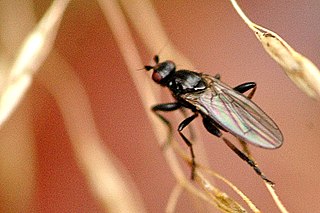
Sphaeroceridae are a family of true flies in the order Diptera, often called small dung flies, lesser dung flies or lesser corpse flies due to their saprophagous habits. They belong to the typical fly suborder Brachycera as can be seen by their short antennae, and more precisely they are members of the section Schizophora. There are over 1,300 species and about 125 genera accepted as valid today, but new taxa are still being described.

Coprinellus is a genus of mushroom-forming fungi in the family Psathyrellaceae. The genus was circumscribed by the Finnish mycologist Petter Adolf Karsten in 1879. Most Coprinellus species were transferred from the once large genus Coprinus. Molecular studies published in 2001 redistributed Coprinus species to Psathyrella, or the segregate genera Coprinopsis and Coprinellus.

Odiniidae is a small family of flies. There are only 58 described species but there are representatives in all the major biogeographic realms.
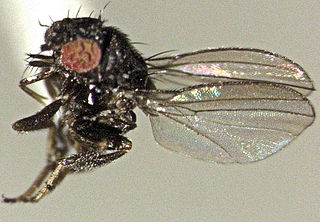
Milichiidae are a family of flies. Most species are very small and dark. Details of their biology have not yet been properly studied, but they are best known as kleptoparasites of predatory invertebrates, and accordingly are commonly known as freeloader flies or jackal flies. However, because of the conditions under which many species breed out, they also are known as filth flies.
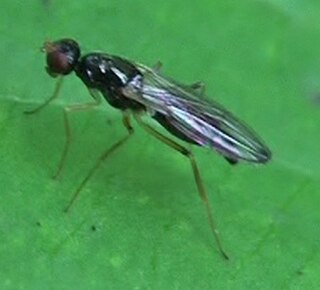
The Strongylophthalmyiidae are a small family of about 80 species of slender, long-legged flies, the majority of which occur in the Oriental and Australasian regions. They are divided into two genera, the monotypic Southeast Asian genus Nartshukia Shatalkin, 1993 and Strongylophthalmyia Heller, 1902. The relationships of the group are obscure; formerly the genus Strongylophthalmyia was classified with the Psilidae, and some recent classifications place it within the Tanypezidae. Little is known of their biology, but many species seem to be associated with rotting bark.

Periscelididae is a family of flies.
The Cremifaniidae are a very small family of acalyptrate flies with only 4 described species worldwide. All species are considered rare, and nothing is known of their life history. They were formerly placed in the family Chamaemyiidae.

Crumomyia is a genus of flies belonging to the family lesser dung flies (Sphaeroceridae).

Limosininae is a subfamily of flies belonging to the family Sphaeroceridae, the lesser dung flies.

Leptomorphus is a genus of fungus gnats in the family Mycetophilidae. There are about 8 described species in Leptomorphus.

Lygistorrhininae, commonly called long-beaked fungus gnats is a subfamily of flies in the Diptera family Keroplatidae. The groups was long treated as a separate family, but molecular phylogenetic analysis has shown it to belong to Keroplatidae. There are about 7 genera and at least 30 described species in Lygistorrhininae.
Periscelis is a genus of flies in the family Periscelididae. There are about 15 described species in Periscelis.

Stenomicra is a genus of flies in the family Periscelididae. There are more than 20 described species in the genus Stenomicra.
Dixella is a genus of meniscus midges in the family Dixidae. There are more than 70 described species in Dixella.

Madizinae is a subfamily of freeloader flies in the family Milichiidae. There are about 8 genera and more than 160 described species in Madizinae.

Odinia is a genus of flies in the family Odiniidae. There are more than 20 described species in Odinia.
Leptometopa is a genus of freeloader flies in the family Milichiidae. There are about 19 described species in Leptometopa.
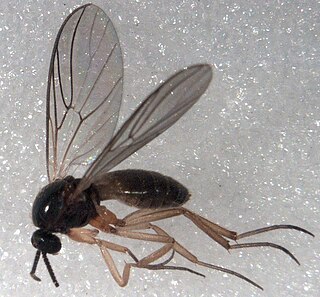
Mycetobia is a genus of wood gnats in the family Anisopodidae. There are more than 20 described species in Mycetobia.
Paramyia nitens is a species of freeloader flies in the family Milichiidae.
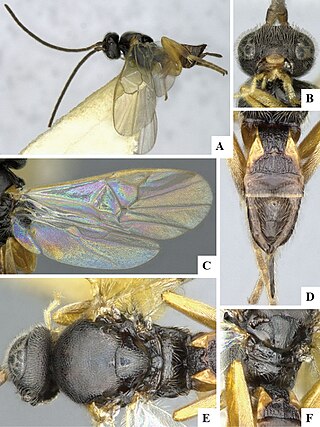
Pholetesor is a genus of braconid wasps in the family Braconidae. There are more than 50 described species in Pholetesor, found mainly in the Holarctic.















